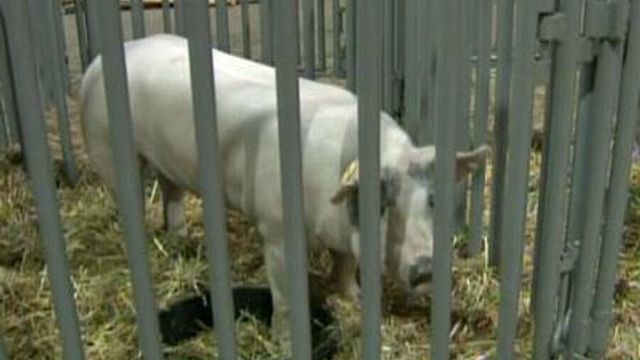N.C. pork producers seeing flu's impact on business
The name "swine flu" and misconceptions about the virus have caused a hardship for North Carolina's pork industry.
Posted — UpdatedA commercial hog herd in Indiana tested positive this week for the H1N1 virus, also known as swine flu, the U.S. Department of Agriculture announced Wednesday. Several show pigs at the Minnesota State Fair contracted the virus last month.
The name “swine flu” and misconceptions about the virus have caused a hardship for the nation's $15 billion pork industry.
“We simply were the victims of a bad name,” said Neil Strother, owner of Strother Swine Farms in Wilson County.
Strother said the H1N1 virus has scared many people away from pork products. People somehow became confused into thinking they could catch the virus from pork.
"Absolutely, complete misinformation was out there,” Strother said.
Agricultural officials have stressed that the virus is not food-borne and that people should not fear consuming pork products.
"There has never been a case of this new pandemic, H1N1, ever being transmitted from animals to humans,” said Dr. Tom Ray, a veterinarian and North Carolina director of livestock health.
Ray confirmed Wednesday that there have also been no cases of H1N1 being transmitted by eating pork. It is a message that pork producers are desperate to get out.
“A lot of the (pork) producers are hanging by a thread,” Strother said. "It is extremely frustrating."
The industry was already suffering with rising feed costs. Strother said he knows pork producers who have gone out of business or who are barely getting by.
“It couldn't come at a worse time,” he said.
Ray said swine producers are currently losing more than $20 a head.
"North Carolina markets somewhere in the neighborhood of about 9 million head a year. (So) this is huge, huge to the economy of the state,” Ray said.
North Carolina ranks second in the nation for hog production, and more than 46,000 people in the state work in the industry.
Deborah M. Johnson, CEO of the NC Pork Council, said last month that about 25 hog farms in the state were sitting idle and another eight were on the brink of closing.
In addition to setbacks from H1N1, hog feed prices soared two years as the need for grain expanded to make bio-fuels. The recent economic crisis has made it nearly impossible to pass those costs on to consumers.
• Credits
Copyright 2024 by Capitol Broadcasting Company. All rights reserved. This material may not be published, broadcast, rewritten or redistributed.





